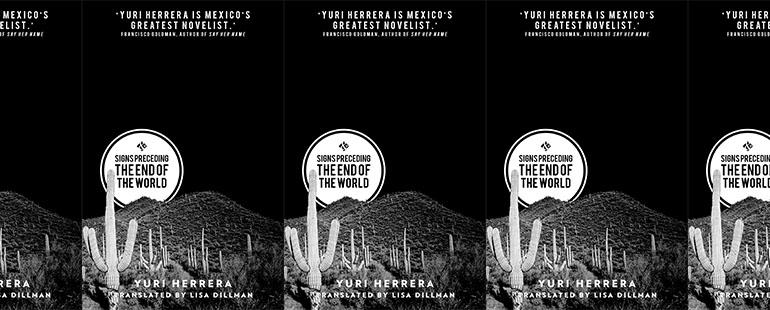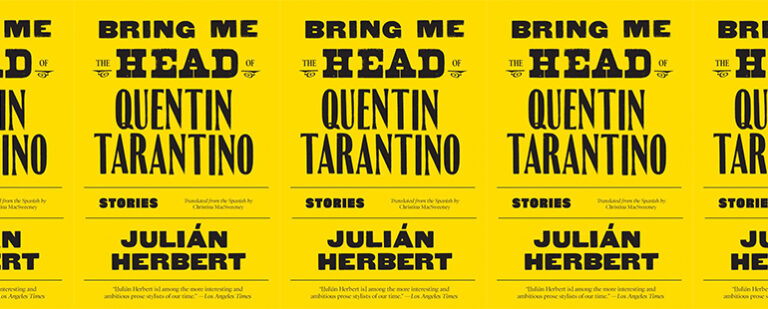Language and Fronteras in Signs Preceding the End of the World

In Yuri Herrera’s Signs Preceding the End of the World, originally published in 2009 and released in translation from the Spanish by Lisa Dillman in 2015, we meet Makina, who crosses the United States and Mexico border in order to find her brother. Makina knows what is required to cross the border: while the physical threats are very real, crossing also carries with it existential threats. Lots can be lost on the journey. Crossing the border also means that Makina will subject herself to a crossing within herself—it’s not just the land and countries that change, but it is the language, the thoughts. Time away from home changes a person.
The novel takes place in an alternate universe very much like our own. But unlike in our world, the dangers manifest physically. The opening words read “I’m dead.” As Makina watches as a literal hole opens up in the ground, she thinks that her world may end. Shortly after she survives this moment, she decides to find her brother, who had crossed the border three years earlier, and never returned. She feels the urgency of having almost died. Staying at home doesn’t guarantee your safety, and being away from family doesn’t guarantee that they stay connected, that they stay family. Makina’s brother felt the same way when he left. He had heard his father may be up north, and that the family may have some land across the border. When dealing with whether to leave or not, Makina saw “the doubt flickering in his eyes you could see he’d spent his whole life there like that, holding back his tears, but before letting them out he turned and versed and only ever came back in the form of two or three short notes he sent a long while later.” For her brother, it was hell staying home, stagnant. Maybe their father was there. Maybe the rumors of them having land up there were true. Literal holes were opening in their home. But for the mother, who knew how difficult crossing the border was, who had grown up and gotten used to the holes emerging in their own world, she stood her ground, stayed home, and expected her son to come back. She drew a line in the sand, and told Makina to let him leave and fend for himself. But he never came back. He only sent a couple of notes back home.
Makina works at a telephone company in a small village. She connects phone calls between family members, lovers, and friends, who often are communicating over borders, whether they be the borders of countries, borders due to distance, or the borders developed by speaking a different language from the one used in your home for so long. Those messages weren’t hers; she was just “the door, not the one who walks through it.” But Makina sees the effect that going through the door has on people. Sees how the phone calls morph over time. How people so quickly forget “the local lingo.” Sees how that makes the love and the pain that much harder to translate, make it that much harder to cross the border that separates them. So when the notes from her brother stop coming, she sees that she will have to go through the door to connect with him, even if she fears the change and disconnect of that crossing.
Makina doesn’t want to leave home, doesn’t want to cross the border and become a person who can’t make it back home to her mother. She doesn’t want to lose herself after she crosses the border. As Makina prepares for her trip, she thinks of a friend who stayed away a little too long (not knowing what exactly is “too long” only adds to Makina’s anxiety). If you stayed too long, it “turned out that everything was still the same, but now somehow all different, or everything was similar but not the same: his mother was no longer his mother, his brothers and sisters were no longer his brothers and sisters, they were people with difficult names and improbable mannerisms, as if they’d been copied off an original that no longer existed; even the air, he said, warmed his chest in a different way.” The fear of not coming back is huge for Makina: you can’t make the trip in a vacuum—you need to harden yourself, and let the other country, their language, their feelings, inside you in order to complete the journey. Makina doesn’t want to be just a conversation overheard by a phone operator, doesn’t want to be just a couple of notes sent to her mother.
This fear comes from the difficulty of the crossing, as well as the complication of what happens when you leave home. Makina writes how she was never sure what she “dreamed, in the same way that she couldn’t be sure a place was where the map said it was until she’d gotten there.” She didn’t know what her brother would be like, or what the experience would be like. Later in this passage, she talks about an impenetrable surface. That impenetrable surface is a border between her dreams and her physical home. And if she breaks through it to reach her dreams, she is afraid that she won’t be able to break back through it again and make it back home, before her home is forgotten to her, like “local lingo” that was lost to the strangers.
The fear of losing her home physically attaches itself to the idea of being blocked out from her own local language. Each language is its own monolith, contains its own borders. And Makina feels comfortable switching back and forth, as long as she always comes back home, to her own lingo. A point is made to identify English as “anglo,” Spanish as “latin,” and indigenous as “homegrown” or “native”; these are labels of identity too. Language is identity in this world. It is in Makina’s and every migrant’s head. Chucho and Makina are crossing the border into the United States when a rancher holds them up at gunpoint, the rancher calls Chucho a coyote. Chucho disputes this, saying that while he won’t deny the act of crossing, he isn’t a coyote. This lines up with Makina’s philosophy—her act is crossing the border. She isn’t trying to stay in the country. She is just trying to check on her brother. To maybe help him cross back. Chucho is just trying to help Makina. Neither wants the permanence of the label. For both, these labels box them in with their borders.
Makina is worried that she will lose her home. That she will cross a border that she won’t be able to come back from. But unlike back home where a literal hole ate things around her, she is worried about the holes in the borders of her language that could shatter any semblance of home she had. That a hole of sorts will open during her travels, like it did when she was at home. Language is the key to opening locked doors. But it’s also a frontera crossed. And Makina knows that staying crossed over for too long makes it hard to cross back. When Makina is home, her ability to switch languages is not a danger, for she is able to return to her native Spanish. She can speak other languages while knowing that she will safely return to her own, like taking a step on a ladder with three points of contact in place. Of course, however, being able to switch languages is one of the reasons that Makina is able to make the trip. At one point she stumbles across two boys who are about to get hustled by a couple of coyotes who are going to let them get caught as a decoy. Makina’s ability to speak anglo saves her from falling for these traps, and she also helps the boys out.
But this switching sounds off when Makina runs into it after having successfully crossed the border. She hears two people speaking “perfect” anglo and latin, switching back and forth. But a sadness creeps into Makina as she notices how they “suddenly stop switching tongues and starting speaking that other one. In it brims nostalgia for the land they left or never knew.” Being unable to stop the switch, and being stuck in the other language, is one of Makina’s biggest fears. Shortly after this moment, Makina looks at some barren land, and thinks, “Whatever once was there had been pulled out by the roots, expelled from this world; it no longer existed.” She sees an anglo there, who tells her that he doesn’t “know what you think you lost but you ain’t going to find it here, there was nothing here to begin with.” There is nothing for Makina in the United States. She fears losing herself more than anything else. She wants to cross the border, grab her brother, and then return before the border re-solidifies itself. Makina is afraid of losing something on land that never had anything there in the first place—for her, for people like her, and maybe for people in general.
Later, Makina is worried about being labeled with papers. About why some people go through all of these hardships just for papers. “That must be why they’re so happy, and don’t mind imitating people who’ve always despised them. Or perhaps they just want the papers…any kind of papers, even if it’s only to fit in; maybe being different gets old after a while.” It is this last thought, of fitting in, of the fatigue of having no stasis, that scares Makina the most. It is the physical label bleeding into her consciousness that scares Makina. The paper solidifying the crossing over the frontera permanently. The crossing back impenetrable. The speaking solely anglo solidifying the loss of latin. How these borders crossed are not so easily uncrossed. No trip is made in a vacuum. And no love or family or home is stagnant either. The notes that the brother left were a form of label that Makina and her mother couldn’t live with. But even in movement, things change, and can’t always change back. Borders can be impenetrable surfaces, and language can open doors that can’t so easily be locked back.


